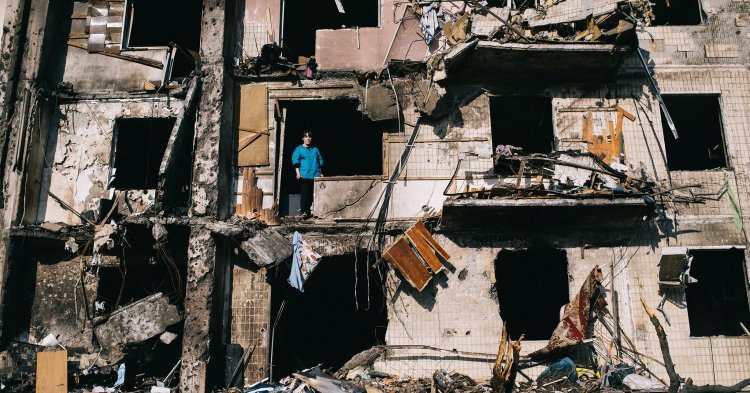The right to self determination is universal. Russia’s invasion represents a gross violation of international norms and peace, and merits universal condemnation as well as severe repercussions.
Beginning in March 2021, Russia has begun to move military forces and heavy equipment to its borders with Ukraine. The buildup had been escalating since October 2021, when Russia began encircling Ukraine by stationing forces in Belarus, ostensibly to conduct military drills. In February 2022, the self-proclaimed, ‘peoples’ republics’ in Luhansk and Donetsk increased their ceasefire violations, killing two Ukrainian soldiers and causing thousands of explosions, stoking up the supposed threat of ‘Ukrainian Aggression’ to create a mass influx of asylum seekers. Despite publicly confirming time and again that Russia does not intend to go to war, on Feb. 24, 2022, it launched a surprise full-scale invasion of Ukraine. The war has already resulted in horrific consequences, both in terms of deaths, property destruction, and severely undermining stability in eastern Europe.
Despite what Russia may claim, its actions are not motivated by the need to protect the human rights of the Russian speaking minority in Ukraine, or to achieve a demilitarized region. In fact, the place where the human rights of Russian speakers are curtailed the most is Russia itself, where effectively citizens are denied their right to freedom of expression, equality before the law, and personal freedoms. Ukraine does not pose any direct military threat to the much stronger Russian Federation.
The real motivations of the Putin regime are both personal and strategic. Personal, because Putin himself believes that ‘color revolutions’, in which the people depose dictatorial regimes, may pose a risk to the internal stability of Russia if allowed to persist, as well as endanger his own kleptocratic regime. Strategic, because the Russian security establishment does not regard the independence of post-Soviet countries as genuine, instead desiring to enforce the historical dominance of Moscow over Ukraine. A recent article - published by the Russian ministry of foreign affairs commemorating the partial annexation of Ukraine by Moscow as part of the Pereyaslav Council in 1654 - highlights their twisted pseudo-historical perspective.
This concept of ‘spheres of influence’ where might makes right and powerful countries enforce their will on smaller, militarily weaker countries, is outdated and immoral. What Russia is trying to achieve is to roll-back international development and enforce its violent and aggressive model of international relations on its neighbors. We can be confident that this aggression (threats are also an aggression) will not stop at Ukraine but may extend to all post-Soviet countries and other former affiliated nations. Another consequence of a successful Russian invasion would be an abolishment of important human rights gains in Ukraine, which have included competitive elections, permitted Pride parades in Kyev, and increased representation for religious minorities in the political and media spheres, including prominent Jewish people such as the incumbent president of Ukraine, Volodymyr Zelensky.
In contrast, the Russian political system prohibits dissent, oppresses religious and ethnic minorities, and encourages ultra-nationalist rhetoric and populism. It is also evident by the fact that in the rebel-held areas of eastern Ukraine, minorities have been targeted several times by local thugs, and antisemitic sentiments run rampant even among the pro-Russian authorities. Alexander Zakharchenko, the former president of the ‘Donetsk People’s Republic’ said the government in Kyev is run by ‘Miserable Jews’. Igor Plotnitsky, the former president of the ‘Luhansk People’s Republic’ has argued that the 2014 Euromaidan revolution was instigated by the Jews of Ukraine. Under the guise of preserving stability during the war itself, Russia has already imposed further crippling limitations on the freedom of expression, banning Twitter, Facebook, and YouTube in its territory, effectively sealing itself off from the world.
Thus, it would be a mistake to look at the war in Ukraine simply as a neighborly dispute or geopolitical muscle-flexing. Rather, it is a clash between systems of values and an attempt to undermine the post-Cold War security architecture in Europe. It is a matter of life and death for the modern European way of life and whoever listens to Putin’s speeches or reads Russia’s draft treaties on security assurances can clearly see the wider goals of this war of aggression.
The conclusion from all of this is that we should perceive this war as an attack on ourselves and completely cut commercial relationships with Russia, support Ukraine with arms and ammunition, and most importantly – prepare ourselves for a long-term hybrid war of attrition between two distinct value systems and narratives, namely democracy versus authoritarianism. Personally, I believe that Europe will come out on top in this long-term struggle because freedom, democracy and human rights are worth fighting for, contrasted with the mad ambitions of a former KGB agent, and I am confident that the majority of peace-loving Russian citizens will not stand for them.


Follow the comments: |
|
